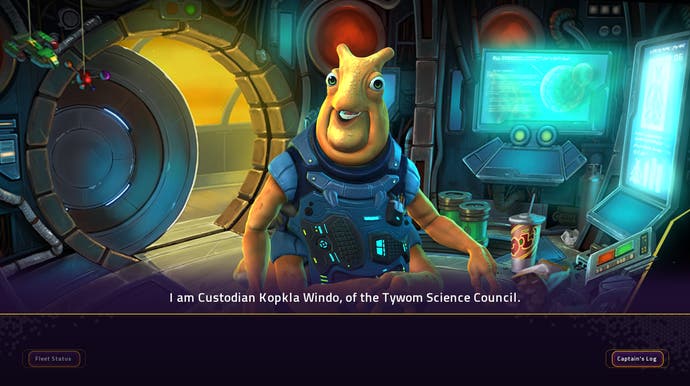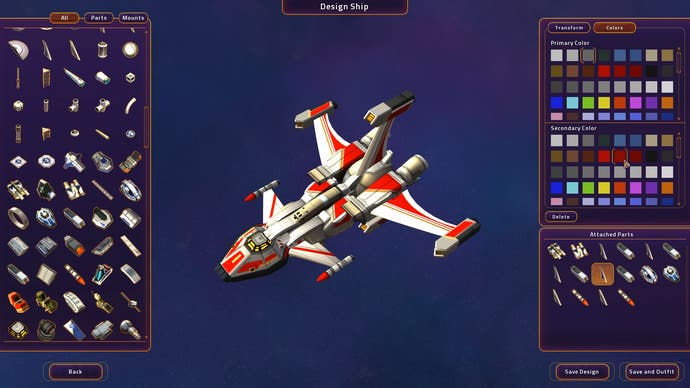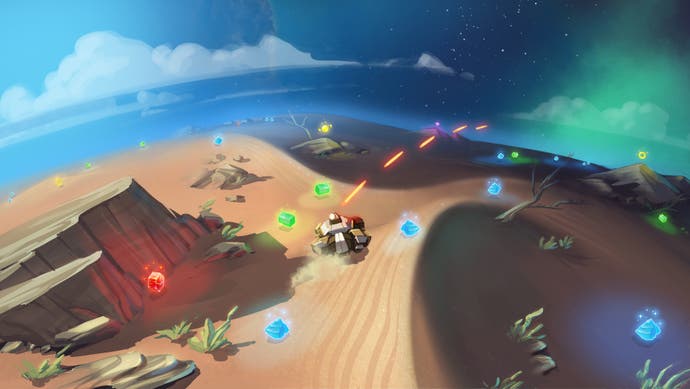The galactic tussle at the heart of Star Control: Origins
Things can only get meta.
Is there something about space games in particular that causes developers to fall out with one another to the extent that it's deemed necessary to dispatch a squadron of legal vipers to sort things out? They've darted between David Braben and his one-time Elite co-pilot Ian Bell, and were once turned on his old publisher, Gametek. Outspoken space sim creator Derek Smart had a dust-up with the same publisher, long before he made it his mission to discredit Wing Commander creator Chris Roberts and his efforts on Star Citizen.
A little less fiery but no less combustible is the stand-off between the original creators of Star Control and current IP owner Stardock, who last month were firing words like "rights", "permission" and "trademark" across one another's bow. Things have gone quiet since, but only because a couple of legal away teams are probably engaged in a bout of judicial kal-if-fee, for which universal translators are set to impenetrable.
To use contemporary presidential patois, it's all rather sad. What's particularly unfortunate in the case of Star Control is, not only is Star Control 2 up there with Elite as one of the greatest space games of all time, fans have had to endure a 25 year wait for the series to progress. That's it's doing so in two directions - a prequel from trademark holders Stardock and a Star Control 2 sequel from the series' creators - almost seems too good to be true. Sadly it might just stay that way if the relationship between the two studios doesn't improve.

When it comes to hearts and minds, in a fight between Star Control's creators and current IP owners, the former are likely to come out on top, if only because Stardock's CEO has over the years rubbed quite a few people up the wrong way. However, what's interesting in this case is that while Brad Wardell has cultivated an image of himself as the combative and unapologetic champion of space strategy gaming, he is deep down a massive Star Control fanboy. "It was released at the same time I was programming the original Galactic Civilizations for OS/2 back in college" he says. "It came out when I was still deciding what I would ultimately do in my career. Star Control 2 effectively made me want to make games as a career rather than a hobby."
When the Star Control brand came up for auction in 2013, Wardell not only saw an opportunity for develop something quite distinct from mainline Stardock games (despite their obvious nods to Star Control races and characters), but to oversee the realisation of a long-held dream common to all Star Control fans: "To reunite the original team from 25 years ago" which, despite the fact that Fred Ford and Paul Reiche had talked openly about returning to the series, "turned out to be a much more difficult task than we thought."
Rather than the collaboration Wardell had long dreamt about, Stardock's early meetings with Ford and Reiche only resulted in an understanding: "They asked us not to use the aliens or try to continue the Star Control 2 storyline as they hoped to one day return to [it]."
To facilitate the creators' eventual return, Stardock renamed the original games, with the much maligned Star Control 3 (developed by Legend Entertainment, which would go on to make Unreal 2) spun out to an alternative universe from the classic Star Control 2 that Ford and Reiche wanted to return to. "This let us create Star Control: Origins on the concept of Star Control being a multiverse" says Wardell, "in which players reach other universes through the Origins - giant precursor structures that allow ships to travel to other universes." - a fudge, clearly, but perhaps necessary if two new Star Control games were to co-exist independently.
Then in December Fred Ford and Paul Reiche released a statement that seemed to collapse the whole metaverse concept: "our games' universe has absolutely no connection, hyper-dimensional or otherwise, with Star Control: Origins." Thus, on the back of some prior combative statements between Wardell and his one-time development heroes over who owns and owes what, we have the basis of yet another falling-out between space game legends, one that not only jeopardises the promising future of revered series, but in seeing the old games pulled from sale, rather seems to threaten its legacy as well.
Sad.

Thankfully not all the fighting currently going on around the Star Control universe is counter-productive. For a couple of months now pre-orderers of Stardock's prequel, Star Control: Origins, have had access to Fleet Battles, a stable though still early version of the game's multiplayer mode, which builds on the original game's celebrated Super Melee Mode by being functionally identical to combat in the main game, while being utterly without consequence and is thus distinctly and immediately engaging. If Star Control's traditional single-player game can be likened to a gentle open-world RPG spoof of classic-era Star Trek, Super Melee is its Kobayashi Maru battle simulator, a carefree venue that allows players to pick a few ships and face off against another player in all manner of no-win situations
The genius of Super Melee that Fleet Battles hopes to emulate, aside from being a Spacewar! For the Jilted Generation, is that rather more than a series of knife-edge duels, Super Melee gleefully revels in multiplayer asymmetry. Each player has 100 points to spend before battle, with a range of vessels currently worth between 6 and 26 points apiece. Between stats such as acceleration, turning, speed and weapon range, and primary and secondary weapons ranging from Big Long Range Lasers and Boarding Parties, to vessels that can shoot black holes and self-destruct in cataclysmic fashion, ships that may seem wildly imbalanced in one round are finely poised the next, with the cat and mouse dynamic forever shifting, not just as new ships warp in, but as they maneuver around gravity wells and asteroids.
Of course, it needs more ships and more abilities, which given the feedback from players, seems likely to be expanded. On the suggestion of fans, Wardell says future battle sites will be littered with wreckage, with a some ships able to scavenge parts for fleet-wide benefits, an example of gameplay "so obvious in hindsight that it's hard to believe we didn't think of it first."

As essential as Fleet Battles/Super Melee is to Star Control's identity, multiplayer mode will always be secondary to any single-player adventure, that of exploring unknown worlds for resources and clues, upgrading ships and meeting strange B-grade alien creatures represented by hilarious characters. To that end, while Origins is disavowed from introducing Captain Fwiffo's illustrious predecessors or establishing any of Star Control's other much-loved alien races, Stardock have the benefit of being in a position to create their own, which would be a curse if not for the fact that it's created many a memorable alien during the course of it's Galactic Civilizations series. Not Star Control levels of memorable, perhaps, but close enough that Stardock should be able to step up to the plate.
Unfortunately we only have a few snippets of lore to go on at the moment, beyond the fact that the Scryve are the bad guys, the Tywom are quite cuddly and probably very nice, and there are rumours of a god-like Ancient One roaming about. What we do know is that the procedurally-generated universe will be sizable, as well we might expect, with thousands of planets to visit and explore. "We wouldn't have tried to do a new Star Control game unless we could deliver something that made the case for its creation obvious while at the same time staying true to what Star Control is," says Wardell. "For example, one thing we couldn't do back in 1992 was have a "living" universe. We all were good at using our imagination back then to imagine that the galaxy had a deep inner life, but today we can create thousands of characters doing their own thing while having a strong story focused on the player."
The most identifiable aspect of Star Control: Origins, and its most divisive, is the graphical style Stardock have employed. Wardell admits that plotting the right course in terms of the art direction has been a challenge, especially since fans remember the old games differently and thus have different expectations to how the new game should look. "I have had fans insist that the Star Control art was photorealistic for its time while others insist it was dark fantasy and others remembering it fondly as being like Hanna-Barbera." As for the new game, most liken it to Spore, favourably or not depending on whether you liked Will Wright's last game before he evolved into a higher being. Wardell hasn't been best pleased with the comparisons, but points out that Will Wright himself was heavily influenced by Star Control. "The new Star Control game is meant to be a natural continuation of the Star Control 2 look. That is, some of the aliens look cute and friendly and some are scary and horrible."
Unfortunately, the scariest things we've seen from Star Control have been between the two talented development teams fighting over its soul. Wardell revealing that Stardock have been discussing sliding the Galactic Civilizations over to Star Control's universe in some form probably won't help settle things down, but it suggests just how important Star Control is to Stardock as a publisher as much as it is to Wardell the Star Control fan. If both are able to deliver a game worthy of its predecessors, and in so doing bring their precursor creators on board as Star Control's true successor takes shape, not only can further legal entanglements can be avoided, space gaming can boast of a rare utopian meta-adventure built on compromise rather than conflict.
Make it so.
